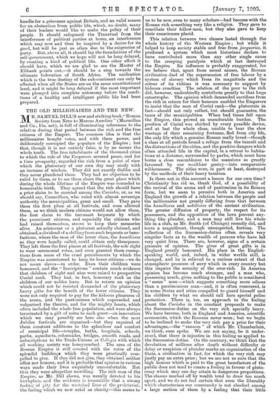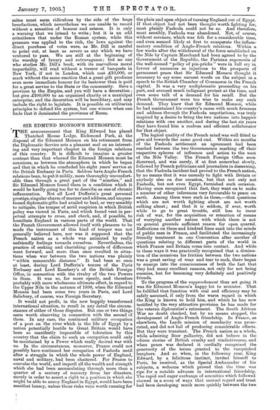M R. SAMUEL DILL'S new and striking book," Roman Society from
Nero to Marcus Aurelius" (Macmillan and Co., 15s. net), is full of illuminating references to the relation during that period between the rich and the free citizens of the Empire. The common idea is that the millionaires bought votes, and with them power, and deliberately corrupted the populace of the Empire ; but that, though it is not entirely false, is by no means the whole truth. The free inhabitants of the thousand cities to which the rule of the Emperors secured peace, and for a time prosperity, regarded the rich from a point of view which the plutocracy of our own day may study with an increase of wisdom. They did not exactly dislike and they never plundered them. They had no objection to be ruled by them, or to see them share the great place which during the whole lifetime of the Empire was conceded to honourable birth. They agreed that the rich should have a prior claim to be counted among the Curiales, or, as we should say, Councillors, who ruled with almost sovereign authority the municipalities, great and small. They gave them the first place at all festivals, and even allowed them, as we think modern citizens would not allow them, the first claim to the incessant bequests by which the prominent citizens, and especially the citizens who had raised themselves, strove to keep their memories alive. An aristocrat or a plutocrat actually claimed, and obtained, a dividend of a shilling from such bequests or bene- factions, where the man of the lower class, the humiliores as they were legally called, could obtain only threepence. They left them the first places at all festivals, the sole right to wear ceremonial robes, and even granted them exemp- tions from some of the cruel punishments by which the Empire was accustomed to keep its lower citizens—we do not mean slaves—in order. Even their children were honoured, and the " Inscriptions " contain much evidence that children of eight and nine were raised. to prospective Curial rank. They had, in fact, honorary rank as the children of our nobles have. But in return an opinion which could not be resisted demanded of the plutocracy heavy gifts for the benefit of the lower citizens. They were not only required to pay for the hideous pleasures of the arena, and the pantomimes which superseded and vulgarised the theatre, and for the mighty feasts, which often included the whole free population, and were always terminated by a gift of coins to each guest—an innovation which we may possibly see here also when the next Jubilee festivals are organised—but they required of them constant additions to the splendour and comfort of municipal life—temples, baths, hospitals, schools, parks, aqueducts, colonnades, bridges, smooth roads, and subscriptions to the Trade-Unions or Collegia with which all working society was honeycombed. The area of the Roman Empire is still covered with the ruins of the splendid buildings which they were practically com- pelled to give. If they did not give, they obtained neither office nor honour, and it is probable that opinion in various ways made their lives exquisitely uncomfortable. Not that they wore altogether unwilling. The rich man of the Empire, as Mr. Dill shows, was usually devoted to his birthplace, and the evidence is irresistible that a strong feeling of pity for the wi:etclied lives of the proletariat, the feeling which we now extol as 'charity—this seems to This relation between two classes lasted through the whole history of the Western Empire ; but while it helped to keep society stable and free from jaegueries, it produced a system which most historians declare to have contributed more than any other single cause to the creeping paralysis which at last destroyed the Empire. Its influence is probably exaggerated, for we believe that, apart from moral causes, the Roman civilisation died of the supersession of free labour by a system of slavery which from its magnitude and the colour of its victims it was necessary to support by hideous cruelties. The relation of the poor to the rich did, however, undoubtedly contribute greatly to that huge catastrophe. The opinion which demanded sacrifices from the rich in return for their honours enabled the Emperors to insist that the men of Curial rank—the plutocrats in fact—should not only collect, but should guarantee, the taxes of the municipalities. When bad times fell upon the Empire, this proved an unendurable burden. The position of Curial was shirked by every possible device, and at last the whole class, unable to bear the slow wastage of their remaining fortunes, fled from city life, the only life which a genuine Roman really loved—though a class at all periods found a refuge from the tumult and the distractions of the cities, and the positive dangers which often attended life in the capital, in a retreat to habita- tions at a distance, surrounded by parks, which must have borne a close resemblance to the mansions so greatly favoured by our wealthier gentry—into comparative wildernesses. The cities were, in part at least, destroyed by the methods of their heavy taxation.
Is there not in this account a lesson for our own time? Christianity has rid us, thank God, of a possibility of the revival of the arena and of pantomime in its Roman form, but we seem to perceive both in America and England the growth of a relation between the people and the millionaires not greatly differing from that between the humiliores and nobiliores of the ancient civilisation. The greater diffusion of property, the respect for its possessors, and the opposition of the laws prevent any- thing like plunder, and a man may still live his whole life in a club, as Mr. Smith (of Chicago) recently did, and leave a magnificent, though unsuspected, fortune. The collection of the Succession-duties often reveals very singular facts as to the wealth of persons who have led very quiet lives. There are, however, signs of a certain pressure of opinion. The giver of great gifts is in England greatly honoured. His place in the English- speaking world, and, indeed, in wider worlds still, is changed, and he is relieved to a curious extent of that atmospheric pressure of envy which in every country but this impairs the serenity of the over-rich. In America opinion has become much stronger, and a man who, possessing much, gives nothing to the public is considered a "mean" man—which suggests something more odious than a parsimonious man—and, it is often rumoured, is in some States and cities compelled to guard himself and. his children by what we should call here special police protection. There is, too, an approach to the feeling about the Curia2es in the constant proposals to make the Succession-duties on the very rich specially heavy. We have become, both in England and America, scientific • economists, which the Romans never were; but we begin to be inclined to make the very rich pay a price for their advantages,—the " ransom " of which Mr. Chamberlain, we think, once spoke. We are not saying, be it under- stood, that there is injustice in this feeling as applied to the Succession-duties. On the contrary, we think that the devolution of millions after death without difficulty dr delay or suspicion of plunder marks an organisation of the State, a civilisation in fact, for which the very rich may justly pay an extra price ; but we are not so sure that the high honour which is paid to the great benefactors of the public does not tend to create a feeling in favour of pluto- cracy which may one day attain to dangerous proportions. The classes marked off by wealth tend to draw too much apart, and we do not feel certain that even the liberality which characterises our community is not checked among a large section of them by a" feeling that their little benefactions, which nevertheless we are unable to record without a sensation of honour and esteem. It is only a warning that we intend to write ; but it is an odd coincidence that under the Roman system, while this pressure was applied to the richk the laws against the direct purchase of votes were, as Mr. Dill is careful to point out, at least as severe as any which we have ventured to pass. We are still at the beginning of the worship of luxury and extravagance ; but no one who studies Mr. Dill's book, with its marvellous moral impartiality, will read without a tremor of banquets in New York, if not in London, which cost £10,000, or mark without the same emotion that a great gift produces even more immediate honour for its bestower than is paid for a great service to the State or the community. Save a province to the . Empire, and you will have a decoration ; but give £100,000 to an organised charity or a municipal enterprise, and the decoration will be hereditary, and may include the right to legislate. It is possible on utilitarian principles to defend the system, but one winces when one finds that it dominated the provinces of Rome.
SIR EDMUND MONSON'S RETROSPECT.















































 Previous page
Previous page